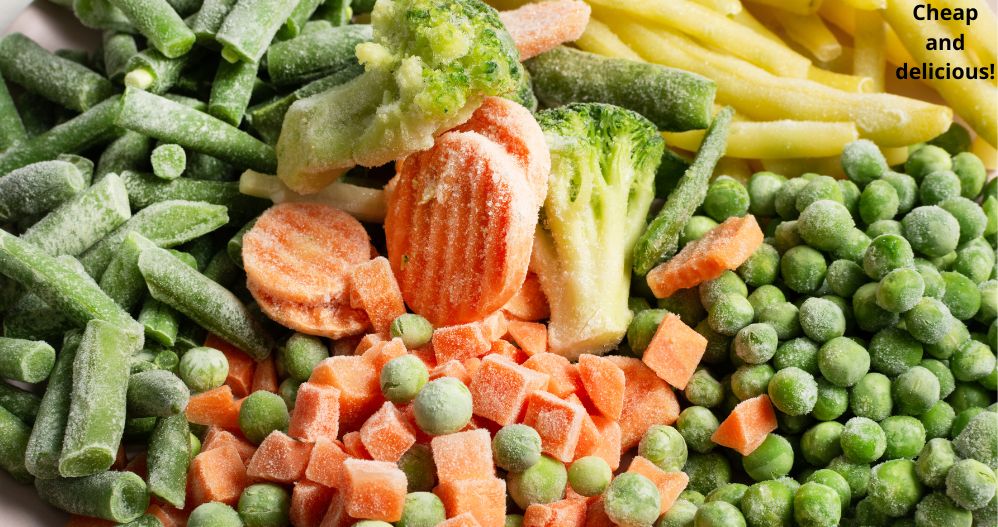Tonight one of the main components of my supper was just microwaved frozen peas – with some cucumber and dill dressing and season salt. Put some peas in a microwave-safe bowl, and cook for 5 minutes. Delicious! So I thought to dig a little deeper into the health benefits of frozen vegetables.
In the fast-paced world of modern living, convenience often takes precedence over health. As people seek ways to balance busy schedules with nutritious eating, frozen vegetables have emerged as a popular solution. Far from being mere convenience foods, frozen vegetables offer a host of health benefits that can play a vital role in a balanced diet. This article explores the nutritional advantages of frozen vegetables, their role in promoting overall health, and why they are a smart choice for both busy individuals and health-conscious families.
Nutritional Value and Quality
One of the most compelling benefits of frozen vegetables is their nutritional value. Contrary to popular belief, freezing vegetables does not significantly diminish their health benefits. In fact, many frozen vegetables are just as nutritious, if not more so, than their fresh counterparts. The process of freezing vegetables involves blanching, which is a quick heat treatment that helps to preserve vitamins and minerals. Once blanched, the vegetables are rapidly frozen, locking in nutrients and freshness.
Research indicates that frozen vegetables can retain their nutritional value for extended periods. For example, vitamins such as A, C, and folate, which are crucial for immune function and overall health, are often preserved in frozen vegetables. In some cases, frozen vegetables can even surpass fresh vegetables in terms of nutrient density because they are often picked at peak ripeness, which ensures optimal nutrient levels.
Convenience Without Compromise
The convenience of frozen vegetables is another significant advantage. Busy schedules can make it challenging to prepare and cook fresh vegetables regularly. Frozen vegetables offer a practical alternative that reduces food waste and preparation time. They are pre-washed, pre-cut, and ready to cook, which means less time spent on preparation and more time for other activities.
Moreover, the longer shelf life of frozen vegetables compared to fresh ones helps to minimize waste. Fresh vegetables can spoil quickly, leading to potential wastage and loss of money. With frozen vegetables, you only use what you need, and the rest can be stored in the freezer until required. This flexibility ensures that you always have a nutritious option on hand, even if your shopping routine is irregular.
Supporting a Balanced Diet
Frozen vegetables are a versatile addition to a balanced diet. They can be incorporated into a variety of meals, from soups and stews to stir-fries and casseroles. This versatility makes it easier to include a diverse range of vegetables in your diet, which is essential for obtaining a broad spectrum of nutrients.
A diet rich in vegetables is associated with numerous health benefits. Vegetables are an excellent source of dietary fiber, which supports digestive health and can help prevent conditions such as constipation and diverticulosis. Fiber also plays a role in maintaining healthy cholesterol levels and regulating blood sugar levels, making it beneficial for heart health and diabetes management.
Additionally, vegetables are packed with antioxidants, which help to combat oxidative stress and inflammation in the body. Antioxidants such as beta-carotene, lutein, and lycopene, found in many vegetables, have been linked to reduced risks of chronic diseases, including cardiovascular disease and certain cancers. The availability of these antioxidants in frozen vegetables ensures that you continue to benefit from their protective effects even when fresh produce is not available.
Cost-Effectiveness
Frozen vegetables are often more affordable than fresh vegetables, particularly when certain vegetables are out of season. Seasonal fluctuations in produce prices can make it challenging to maintain a consistent and budget-friendly diet. Frozen vegetables provide a cost-effective solution by offering stable prices year-round.
The affordability of frozen vegetables also means that individuals and families can access a wider variety of vegetables without breaking the bank. This increased accessibility contributes to a more balanced diet and encourages the consumption of a diverse range of vegetables, which is crucial for meeting nutritional needs.
Environmental Impact
Choosing frozen vegetables can also have positive implications for the environment. The extended shelf life of frozen vegetables helps to reduce food waste, which is a significant issue in both developed and developing countries. Reducing food waste not only conserves resources but also lessens the environmental impact associated with the production, transportation, and disposal of food.
Furthermore, many frozen vegetable producers focus on sustainable farming practices, including reducing water usage and minimizing chemical inputs. By supporting brands that prioritize sustainability, consumers can contribute to environmental conservation while benefiting from the health advantages of frozen vegetables.
Cooking and Preparation Tips
To maximize the health benefits of frozen vegetables, it is important to prepare them properly. Steaming or microwaving frozen vegetables is often preferable to boiling, as boiling can lead to the loss of water-soluble vitamins. Steaming helps to retain more of the vegetable’s nutrients while still providing a tasty and nutritious dish.
Additionally, consider incorporating frozen vegetables into a variety of recipes to keep meals interesting and flavorful. For example, add frozen spinach to smoothies for a nutrient boost, or mix frozen peas into a rice dish for added texture and flavor. The versatility of frozen vegetables allows for endless culinary creativity.
Conclusion
Frozen vegetables are more than just a convenient alternative to fresh produce; they offer a range of health benefits that make them a valuable addition to any diet. With their preserved nutritional value, ease of preparation, cost-effectiveness, and positive environmental impact, frozen vegetables provide a practical and healthy solution for modern living. By embracing frozen vegetables, individuals and families can enjoy the convenience of quick meal preparation while reaping the numerous health benefits associated with a diet rich in vegetables. Whether you’re a busy professional or a health-conscious family, frozen vegetables are a smart choice that supports both your well-being and your lifestyle.

